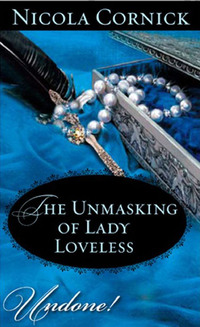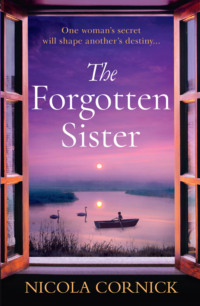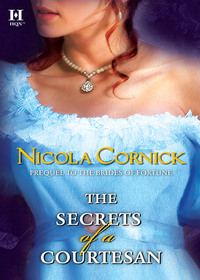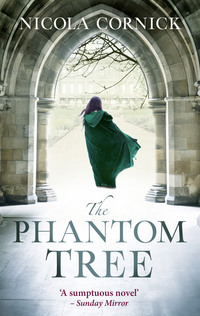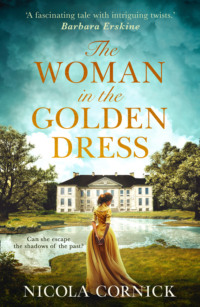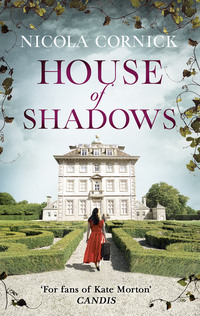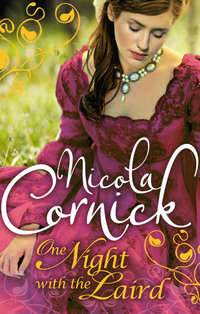
Полная версия
Kidnapped: His Innocent Mistress
‘You have more resolution than I gave you credit for,’ Neil said. The smile was in his eyes again, admiration mixed with regret. ‘I should have remembered that you are a Balfour of Glen Clair. They can be damnably obstinate.’ He sighed. ‘I do not suppose,’ he added, ‘that you trust me now.’ There was an odd tone in his voice, as though he sincerely regretted it.
‘If I do not it is your own fault,’ I said. I smiled a little, being unable to help myself. ‘I never did trust you, Mr Sinclair. Not really. I always suspected you were a dangerous scoundrel.’
That made him laugh. ‘Just as I always knew you were wild—even when you pretended otherwise.’
‘The door is behind you,’ I said. ‘Goodnight.’
When Mrs Campbell came in a bare two minutes later, to help me with my laces, she found me sitting on the edge of the hard little bed with my gown still clutched to my breast, and she was forced to point out that it would be quite ruined to wear in the morning.
Chapter Four
In which I meet with strange travellers on the road and see Mr Sinclair again sooner than I expect.
The rainstorm blew itself out in the night. The clouds scattered on a fresh wind from the sea. Dawn crept in at about five-thirty in the morning, the light spilling over the mountains to the east.
I had been awake on and off all the night, my dreams, when I had them, broken with memories of my parents and fears about the new day, as well as with strange desires and longings that seemed to feature Neil Sinclair rather more than was wise. I heard the first of the fishermen drag his nets across the cobbles, and the splash of the boat putting to sea before it was properly light. I was ready, with my bags packed, by seven thirty.
Mr Sinclair greeted me at the bottom of the stair when Mrs Campbell and I went down together. I had wondered how I would feel to see him in the daylight, but his manner was so impersonal that I had the strangest feeling that the scene between us had been just another of my broken dreams. We took bread and honey and ale for breakfast, and then I went out onto the quay for a walk.
The carriage from Glen Clair did not come. The clock crept around to nine, then nine-thirty, and then ten. I walked the length of the quay in one direction and then back again, and then around for a second time. As I passed the inn I could see Mrs Campbell sitting in the parlour, her face starting to tighten into nervous lines. The drover’s cart was due to leave for Applecross immediately after midday and I knew she did not want to be left behind.
I sat on a bench, looking out to sea, and thought of my new relatives—who did not appear to have sent their carriage for me and had not sent a messenger to explain why. It scarcely argued an eagerness to see me. Even though the sun was warm again I drew my shawl a little closer about me. The seabirds were soaring and calling out in the bay. From here my road turned eastwards, away from the coast and into the mountains to Torridon and Kinlochewe and on to Glen Clair. I had lived by the sea all my life. It was in my blood. And though Glen Clair was only a day’s drive inland, it felt as though I would be leaving a part of me behind.
I stood up, stiff and a little cold from the sea breeze, and made my way back towards the inn parlour. I could hear the chink of harness where the drover’s cart stood waiting in the yard. Mrs Campbell would be starting to fuss.
She was. The maidservant had brought in plates of crab soup and crusty rolls for our luncheon, and just the smell was making me hungry, but Mrs Campbell was too nervous to eat. She sat fidgeting with her soup spoon.
‘There is not another cart back to Applecross for nigh on a week,’ she was saying, ‘and my cook and maid cannot manage a Sunday dinner alone. What am I to do?’
I laid a hand over hers. ‘Dear ma’am, please do not concern yourself. I can await the carriage here on my own. I am sure the landlady will stand chaperon for a short while.’
Mrs Campbell’s anxious face eased a little. ‘Well, if you think that would serve—’
‘There is no landlady,’ Mr Sinclair said helpfully. ‘The landlord is a widower.’ He had come in from the stable yard with his dark hair ruffled by the breeze, and he smelled of fresh air and horses and leather. It was not unpleasant. In fact it was rather attractive, and I was annoyed with myself for thinking so.
I frowned at him to compensate. ‘I am sure there must be someone who could help me?’
‘I could help,’ Mr Sinclair said. ‘I could escort you on to Glen Clair.’
I looked at him. ‘That would not be appropriate,’ I said. ‘Given that…’ I paused. Given that you are a scoundrel who tried to seduce me last night. I did not say the words aloud, but I could see from the bright light in his eyes that he was reading my mind. He waited, head tilted enquiringly.
‘Given that we would not be chaperoned,’ I said.
He smiled. ‘But we are cousins of a kind,’ he said, ‘so it would be entirely proper.’
Mr Sinclair had a habit of silencing me.
‘So we are cousins now, are we?’ I said, when I had recovered my breath. ‘How very convenient.’
His smile deepened. ‘I swear it is true,’ he said. ‘I am third cousin twice removed to Mrs Ebeneezer Balfour on my mother’s side. You may check the family bible if you do not believe me.’
‘Oh, well,’ I said sarcastically, ‘that is quite acceptable, then.’
Mrs Campbell frowned. ‘I am sorry, Catriona,’ she said, ‘but I do not think that so distant a connection is entirely reliable.’
‘No,’ I said, trying not to look at Mr Sinclair, who looked the absolute antithesis of reliable. ‘Perhaps you are correct, ma’am.’
We were saved from further dispute by the arrival of the carriage from Glen Clair. With a cry of relief, Mrs Campbell swept me up, carried me out into the yard and installed me in the coach without even permitting me to finish my crab soup.
‘All will be quite well now, my love,’ she said, ignoring the fact that the coachman was the most villainous-looking fellow that one could imagine. ‘You will be safely in Glen Clair by nightfall, and I know your family will be delighted to see you.’ She kissed me enthusiastically on both cheeks. ‘Pray write to me often.’
Mr Sinclair was handing my bags up to the groom, and suddenly I felt very alone. Neither the coachman nor the groom seemed inclined to speak to me, and neither had vouchsafed anything beyond a surly greeting.
Mr Sinclair came alongside the window to bid me farewell, and for once the impudent light was gone from his eyes. He looked sombre and very serious.
‘I wish you good fortune, Miss Balfour,’ he said, quite as though we might never meet again.
‘Do you ever go to Glen Clair to call upon your third cousin twice removed, Mr Sinclair?’ I asked impulsively.
He smiled then. ‘Very rarely, Miss Balfour,’ he said. ‘But you will see me in Glen Clair before the month is out.’
I felt relief and a strange sense of pleasure to hear it, but naturally I was also rather annoyed with myself for making it appear that I actually wanted to see him again. I tilted my chin haughtily and gave him my hand in what I hoped was a dignified manner. But he simply turned it over, kissed my palm, and gave it back to me with quizzically lifted brows. The colour flamed into my face and I wished Mr Sinclair at the bottom of the loch.
‘Thank you,’ I said frostily, ‘for the service that you have rendered me, Mr Sinclair.’
‘A pleasure, Miss Balfour,’ he said. He smiled straight into my eyes. ‘Should you reconsider my offer, you need only send to me.’
‘A refusal so often offends, Mr Sinclair,’ I said. ‘You must be a brave man indeed to risk a second rebuff.’
He laughed. ‘You have not seen Glen Clair yet,’ he said cryptically.
‘So you are the lesser of two evils?’ I enquired. ‘I shall bear that in mind.’
His laughter was still in my ears as the carriage lurched out of the inn yard and away along the cobbled street that fronted the quay. I craned my neck for a last view of the sea, until the road turned inland towards the high mountains and the last shimmer of sparkling blue was lost from my sight. And though I tried not to think of Mr Sinclair paying court to the ladies of Edinburgh, the thought of him stayed in my mind for most of the long journey to my new home.
Now, it may appear to readers of my narrative that I am much concerned with modes of transport, but it could not escape my notice that the carriage sent from Glen Clair was much inferior to that of Lord Strathconan. As I sat down on the straw-stuffed seat a thick cloud of dust arose and settled on my skirts in a clinging grey film. I was sure that I saw a flea jump out of the cushions.
It seemed that with every rut in the track the coach threatened to shake to bits. I began to feel a little travel sore, so to take my mind from the journey I tried to concentrate on the view as we lurched along the road. Afternoon was well advanced by now, for our progress was slow, and the sun was dipping behind the high mountains. The heather on the slopes merged with the bracken into a purple and amber mist. Above the rocky peaks soared a single eagle, the sun bright on the gold of its head. The road wound its narrow way along the valley bottom beside a trickling burn fringed by pines. It was very beautiful, but to me, accustomed to the friendly scatter of the homesteads at Applecross, it seemed an empty landscape and a deserted one. I imagined that the jagged peaks and the bare hillsides might drive some men mad with loneliness.
The sun had long vanished behind the mountains, the purple shadows were fading to shades of grey and I was very hungry when we turned down an even narrower lane, rattled over a wooden bridge across the stream and drew alongside a broad loch that I realised must be Loch Clair at last. I sat forward, searching the dusk for my first glimpse of the house, but there was nothing ahead—no lights, no sign of life but the last flickering silver of the light on the water.
I sat back again, feeling slightly disappointed. As I did so the carriage lurched to a stop and there was a silence. I waited a few moments for one of the servants to come and tell me the reason for the delay. No one appeared, so I tried to open the carriage window to see what was going on. But the frame was splintered and the window stubbornly refused to move. I opened the door and stuck my head out.
We had stopped halfway along the edge of the loch. To one side of the carriage there was the water, and on the other side the rocky wall of the hillside rose straight and sheer from the edge of the road. It was only with the greatest difficulty that I was able to open the door wide enough to jump down.
Gathering up my skirts, I hurried around to the front of the coach. The horse—a tired old beast with a white star on its head and manners far more pleasant than that of its driver—whickered in greeting and nuzzled my pockets for a treat. I patted his nose.
The road unrolled before me, stretching away to a small wood at the end of the loch. There was no sound but for the whisper of the wind in the reeds by the water. The same wind brought the scent of woodsmoke faintly on the air. It was cold air, and it breathed gooseflesh along my skin, for the coachman and groom had completely vanished.
A second later instinct made me aware that I was no longer alone on the road. I spun around, but I was a moment too late. Strong arms had caught me from behind, pulling me backwards against a hard male body. A hand came down over my mouth. Through my struggles—for I wriggled and kicked and strained to be free, of course—I had a confused impression of movement about me, and I heard the scrape of steel on stone.
I never scream. I have never been able to. When I was a child and the village boys teased me and pulled my hair, my cries of anger always came out as frustrated squawks. It was most vexatious to lack this accomplishment at a moment when it would have been useful to scream loud enough to make the mountains ring. It would also have been useful to be built along more generous lines, for I was slight and thin, and no match for my captor’s strength. In less than a moment he had both my hands held behind my back in just one of his. His grip was tight, and he held me hard against his own body so I had no chance to escape nor even to see his face.
‘I never scream,’ I said, when I had ceased my struggles and caught my breath. Since he still had his hand over my mouth, this came out something like, ‘Mmmmmfffff.’
Surprisingly, he took his hand away.
‘I never scream,’ I repeated.
‘No one would hear you if you did,’ he said. He spoke with a remarkably strong Highland burr, so his words came out something like, ‘Nae oon wuid hear ye an ye did.’
I have always liked the Highland brogue, and his voice was low and melodious and oddly attractive. I had to remind myself that he was a felon and up to no good. His words were all too obviously true. There was not a soul in sight. No one would come to save me even if I had a scream like a banshee.
I sighed instead. ‘What have you done with the coachman and the groom?’
‘They ran away.’ The laconic answer held a hint of amusement.
I made a sound of disgust. ‘Cowards!’
He moved slightly, though his grip on me did not slacken. ‘I cannot disagree with you there.’
‘So what do you want?’ I demanded. ‘Are you a footpad? If so, I can tell you that I have no money.’
This was not precisely the case. I had the five pounds that the trustees of St Barnabas had sent, plus a further five pounds donated most generously by my father’s scholarly colleagues, and yet another pound confided to me by Mr Campbell—who had probably taken it, most improperly, from the Sunday collection plate. This grand total of eleven Scottish pounds would be riches indeed for a thief on the road.
I thought that I felt my captor shake with silent laughter. ‘I do not believe you,’ he said. ‘You are a lady. You must be rich.’ He slid his free hand caressingly down the length of my body and I stiffened with outrage beneath his touch. ‘Shall I search you,’ he continued, ‘to see if you tell the truth?’
‘Do so and I shall see you hanging on the end of a rope for your pains,’ I said, between my teeth. It was strange, but I had a feeling that robbery was not his aim at all—nor the ravishment of innocent young ladies. Even as we spoke I sensed that his mind was working with some other urgent preoccupation.
‘So you think me a highwayman?’ he said.
Something clicked in my mind then—the smell of the smoke, the other men who had passed, the scrape of metal on the stone. I realised that they must have been moving a whisky still. The Highlands were rife with illicit whisky distilleries, tucked away in every mountain glen. It was the curse of the excise men, because all the local populace would be part of the conspiracy—even to the point of local ministers hiding bottles of malt in coffins in the church.
‘No,’ I said, ‘I don’t think you are a highwayman. I think you are a whisky smuggler.’
I felt the surprise go through him like a lightning strike, and in that moment his grip on me loosened and I pulled free and ran.
On reflection it was not a sensible thing to have done. The light was fading fast now, and I could barely see to put one foot before the other. I did not know where I was and I had nowhere to run to. Besides, my captor was a lot quicker and stronger than I was.
He caught me within six paces, as I dived into a copse of pine trees in a vain attempt to hide. If I had thought him rough before, it was nothing to how he treated me now. He grabbed my arm, knocking me to the ground and pinning me there with the weight of his body on mine. All the breath was crushed out of me.
The ground beneath me was dry and soft with last year’s pine needles. I lay still, inhaling the sharp, fresh scent and trying to catch my breath. It was too dark to see his face, but I was aware of every tense line of his body against my own. My hands were trapped against his chest, and beneath the coarse material of his coat I could feel the hardness of muscle and his heart beating steadily. In that moment all my senses seemed acutely sharp, so much so that I could smell the scent of him: leather, horses, fresh air and an echo of citrus that mingled with the smell of pine. His cheek brushed mine, and I felt the warmth and roughness of his skin against my own. A shiver seemed to echo its way through my entire body. And in that moment, although I could see nothing of his face in the darkness beneath the trees, I recognised him and knew who he was.
‘Mr Sinclair!’
I heard him swear, and he clapped a hand over my mouth again. ‘Quiet!’
I ignored him, trying ineffectually to struggle free from beneath his weight.
‘When you said I would see you within the month,’ I said, ‘I had no notion you meant it to be so soon.’ I took a deep breath. ‘And what the devil,’ I added, ‘do you think you are doing, smuggling whisky and accosting young ladies on the road?’
His grip relaxed a little, though he still held me pinioned beneath him. It was, in truth, disturbingly pleasant to be held thus, so hard against him. My body, which seemed to have developed a will of its own from the first moment I had met Mr Neil Sinclair, was busy telling me just how pleasurable the whole business was. I tried to ignore the stirring of desire deep inside me, but Neil would not let me up, trapping me with one leg across my skirts and thus keeping me trussed up beneath him.
‘Stop struggling,’ he said, and his voice sounded lazily amused. ‘I rather like you like this, Miss Balfour.’
I gave an angry sigh. ‘You have not answered my question,’ I said. I relaxed for a moment, staring at the spiky pattern of the pine needles against the dark blue of the night sky. ‘Why smuggle whisky?’
‘Why not?’ He sounded maddeningly reasonable. ‘The King’s taxes are criminally high.’
‘But you are an officer in the Navy and heir to an earldom!’
‘Which has nothing to do with the exorbitant state of the taxes.’ He moved slightly, his hand coming up gently to brush the tumbled hair away from my face in what was almost a lover’s touch.
‘I cannot have a conversation about tax with you in this situation,’ I said, resisting the urge to turn my cheek against the caress of his fingers. ‘It is ridiculous.’
‘As you say.’ His voice had dropped. ‘Taxes are not the matter uppermost in my mind, either.’ He leaned closer. And at that point, when every fibre of my being was aching for him to kiss me, we heard the sound of horses on the road.
We both froze absolutely still.
‘Excise men?’ I whispered.
‘Maybe.’ In the darkness his face was set in taut lines.
‘I could call out for help—’
His gaze came away from the road and focussed hard and fast on mine in the moonlight. ‘Then why do you not?’
For a long, long moment of silence I looked up into his face, and then I took a deep and deliberate breath.
Throw down the gauntlet…
His mouth came down on mine so swiftly that I never had a chance to call out, and after the first second I completely forgot that that was what I had been intending to do. The sensuality flared within me in a scalding tide, drowning out thought. He kissed me again, fiercely, hungrily, and I instinctively understood somewhere at the back of my mind that this was something that been going to happen between us from the very first moment that we had set eyes on one another.
No one had ever kissed me before. My being the schoolmaster’s daughter, the village lads had thought me above their touch, whilst the gentlemen who had visited the Manor had thought me beneath their notice. So, although I understood the theory of love from my reading and from observation, I was quite an innocent. But Neil Sinclair did not kiss like a gentleman, and he made no concessions to my inexperience, so I had no time to worry about what to do, or how to go about the whole business of kissing. In fact, I do not believe that I spared it one thought, but simply responded to the ruthless, insistent demand of his mouth on mine.
When he let me go, the pine needles and the stars pricking the skies above them were spinning like a top. I saw the flash of his smile in the darkness.
‘Thank you,’ he said. And then he was gone.
I lay still for another long moment, thinking of the arrogance of the man in thanking me for something he had not had the courtesy to request in the first place but had simply taken, like the thief he was. Then I struggled to sit up, and from there, by degrees, to stand on legs that felt all too unsteady. I could still feel the imprint of Neil Sinclair’s lips on mine, a sensation that threatened to rob me of any remaining strength. Then I told myself that I was acting like a silly little miss—and that Mr Sinclair had behaved like the scoundrel he undoubtedly was, and deserved everything that was coming to him. I took that long-delayed deep breath and found that I could scream after all.
‘Help! Smugglers!’
I stumbled out of the woods and onto the road—right in front of two English Army redcoats. Their horses shied and almost set the poor old coach horse off at a gallop—except that it was long past such excitement. One of the soldiers was so startled that he already had his musket raised and wavering in my direction.
‘What the hell—’
Indeed. What I can have looked like, tumbling out of the trees with pine needles in my hair and my clothing askew, can only be wondered at. He was a short, stocky man, and from what I could see of his expression in the rising moonlight I would have said he looked of nervous disposition. Not the kind of temperament to suit hunting smugglers through the Scottish glens.
His companion was a very different matter. Tall, fair and languid, he put out a hand to soothe the other man and stop him shooting me in a fit of anxious overexcitement.
‘Put away your gun, Langley,’ he murmured. ‘Can you not see this is a lady? You will frighten her.’
He dismounted with one fluid movement and was bowing before me. ‘Madam,’ he said, ‘Lieutenant Arlo Graham, at your service. Smugglers, you say?’
‘Whisky smugglers in the woods,’ I said. ‘What are you waiting for?’ I looked from one to the other. ‘They are getting away.’
Lieutenant Graham sighed. He seemed utterly disinclined to plunge off up the wooded mountainside in hot pursuit. Perhaps it would have disarranged his uniform.
‘Too late,’ he said. ‘They will be well away by now.’ He turned to the carriage. ‘Is this your conveyance, madam?’
‘Yes,’ I said. ‘I am Miss Balfour, niece to Mr Ebeneezer Balfour of Glen Clair.’
‘But where is your coachman?’
‘I have no notion,’ I said truthfully. ‘I believe the wretch ran off when the smugglers stopped the coach.’
‘And why should they do that?’ Langley interposed. Rudely, I thought. ‘If they were smuggling whisky why draw attention to themselves by stopping the coach?’
‘I have no notion,’ I said again, rather less patiently this time. ‘I am not in their confidence, sir.’
Lieutenant Graham smiled. ‘Of course not, Miss Balfour.’
Langley frowned suspiciously. ‘And what were you doing in the woods yourself?’
I looked at him. ‘Hiding, of course. What else would I do with such ruffians about?’
‘What else indeed?’ Lieutenant Graham said. ‘That blackguard of a coachman, running off and leaving a lady unprotected! I am sure your uncle will turn him off on the spot. Now, pray let me escort you to Glen Clair before you take a chill, Miss Balfour. Langley, you can drive the coach and lead your horse. I will take Miss Balfour up with me.’
Before I could protest, he had remounted the very showy chestnut and reached down to swing me up before him. His arm was strong for such a deceptively indolent fellow. The horse, clearly objecting to the excess weight, sidestepped and threatened to decant me on the verge. I grabbed its mane and reflected that it was only in stories that the heroine was so featherlight that the poor horse did not suffer.


